
Republican Opinion Shifts on Russia-Ukraine War
作者:Moira Fagan, Jacob Poushter and Sneha Gubbala
Democrats significantly more likely than Republicans to rate NATO positively and to say U.S. benefits from membership
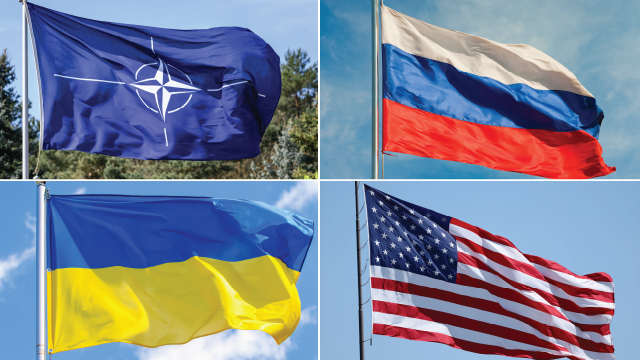
How we did this
Pew Research Center conducted this study to understand Americans’ opinions of NATO, Russia and the war between Russia and Ukraine. This analysis builds on previous Center research on Americans’ opinions of NATO, Russia and the war between Russia and Ukraine and on the most pressing foreign policy issues of the day going back decades, such as major world conflicts, trade and tariffs, U.S. military decisions and other related developments of the times.
For this analysis, we surveyed 3,605 U.S. adults from March 24 to March 30, 2025. Everyone who took part in this survey is a member of the Center’s American Trends Panel (ATP), a group of people recruited through national, random sampling of residential addresses who have agreed to take surveys regularly. This kind of recruitment gives nearly all U.S. adults a chance of selection. Surveys were conducted either online or by telephone with a live interviewer. The survey is weighted to be representative of the U.S. adult population by gender, race, ethnicity, partisan affiliation, education and other categories. Read more about the ATP’s methodology.
Here are the questions used for this analysis, along with responses, and its methodology.
More than three years after Russia’s invasion of Ukraine, Americans remain divided along partisan lines in their views of the conflict, as well as in their attitudes toward NATO and perceptions of Russia.
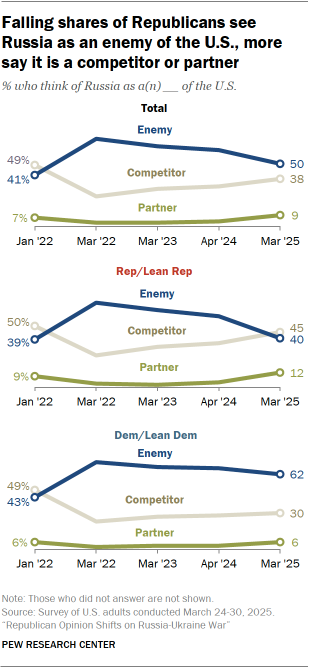
Republicans and Republican-leaning independents have become less likely over the past year to say Russia is an enemy of the United States – and more likely to call it a partner or competitor.
Republicans have also become less likely to say the U.S. has a responsibility to help Ukraine defend itself and to express concern about Russia defeating Ukraine or invading other countries in the region. As a result of this change in opinion, the partisan gap on many of these issues has grown.
For example, when asked whether Russia is an enemy, competitor or partner of the U.S., 40% of Republicans say Russia is an enemy, down from 58% last year. The share of Democrats and Democratic leaners who see Russia as an enemy is down 5 percentage points over the same period. Overall, half of Americans now call Russia an enemy, down from 61% in 2024.
These are among the findings from a Pew Research Center survey conducted March 24-30, 2025, among 3,605 U.S. adults.
Views of NATO
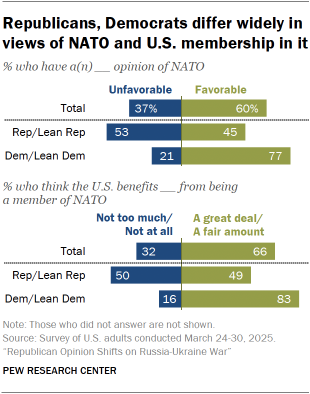
Americans continue to see NATO in a mostly favorable light, and views among Republicans, Democrats and the public overall have changed little over the past year. As has long been the case, Democrats are much more likely than Republicans to have a positive opinion of the military alliance.
About two-thirds of Americans (66%) say the U.S. benefits from NATO membership, though this share has decreased slightly from 71% in 2021. This drop is reflected among Republicans (down 6 points) while opinion among Democrats has held steady.
Views of Russia and Putin
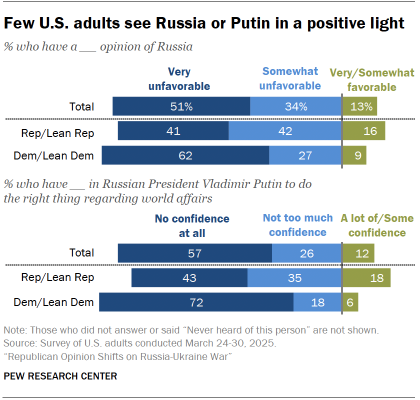
Few in the U.S. see Russia favorably (13%) or have confidence in Russian President Vladimir Putin to do the right thing regarding world affairs (12%).
Both Democrats and Republicans have generally negative views of Russia and Putin, but these attitudes are more intense among Democrats – who are more likely than Republicans to express very unfavorable views of Russia (62% vs. 41%) and say they have no confidence at all in Putin (72% vs. 43%).
Over the past year, Republicans have become somewhat more likely to see Russia favorably and to express confidence in Putin, while Democratic views are largely unchanged.
Views of the Russia-Ukraine war
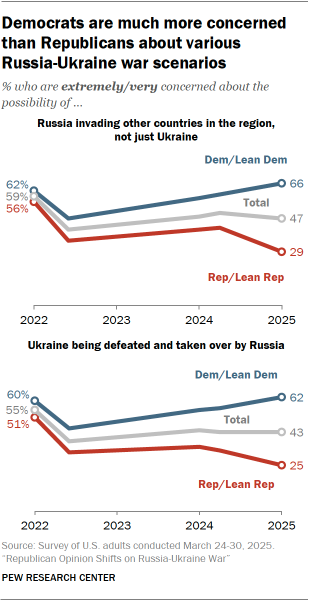
Nearly half of Americans (47%) are extremely or very concerned about Russia invading other countries, and 43% are concerned about Russia defeating and taking over Ukraine. Republicans have become less concerned about both possibilities in recent months, while Democrats have become more so.
Majorities of Republicans and Democrats alike see the war between Russia and Ukraine as important to U.S. interests, though Democrats are more likely to hold this view. Most Americans say the war is important to them personally, too, including 47% of Republicans and 66% of Democrats.
When it comes to Ukrainian President Volodymyr Zelenskyy, 49% have confidence in him to do the right thing regarding world affairs. Democrats are much more likely to express confidence in Zelenskyy than Republicans (70% vs. 30%).
